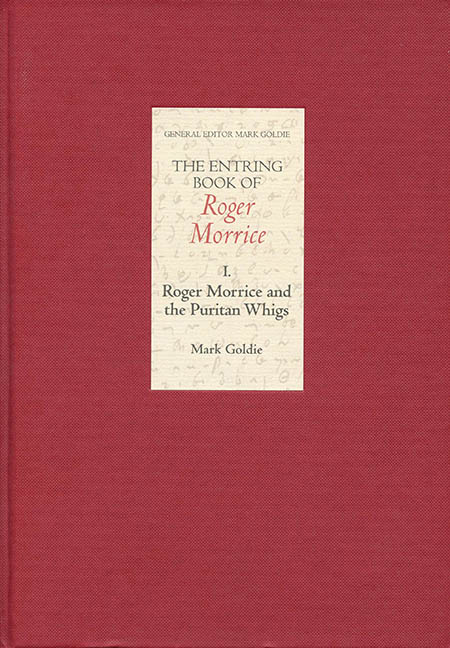Book contents
- Frontmatter
- Contents
- List of Illustrations
- Foreword
- Preface
- Notes on the Editors
- Acknowledgements
- Reader's Guide
- Abbreviations
- Genealogical Tables
- Maps
- Maps
- 1 Politics and Religion in the Era of the Entring Book
- 2 Roger Morrice: Fragments of a Life
- 3 The Text of the Entring Book
- 4 Puritan Whigs
- 5 Country Whigs
- 6 Middle-Way Religion
- 7 The History of the Puritans
- 8 Epilogue: The Entring Book and the Historians
- Appendices
- Bibliography
- Index
2 - Roger Morrice: Fragments of a Life
Published online by Cambridge University Press: 07 October 2017
- Frontmatter
- Contents
- List of Illustrations
- Foreword
- Preface
- Notes on the Editors
- Acknowledgements
- Reader's Guide
- Abbreviations
- Genealogical Tables
- Maps
- Maps
- 1 Politics and Religion in the Era of the Entring Book
- 2 Roger Morrice: Fragments of a Life
- 3 The Text of the Entring Book
- 4 Puritan Whigs
- 5 Country Whigs
- 6 Middle-Way Religion
- 7 The History of the Puritans
- 8 Epilogue: The Entring Book and the Historians
- Appendices
- Bibliography
- Index
Summary
ALMOST everything we know about Roger Morrice derives from his own archive in Dr William's Library, from his will, and from inferences drawn from these documents. Morrice almost never appears in the diaries, correspondence, or publications of his contemporaries. On the rare occasions that he is mentioned, he characteristically appears as an antiquary and collector of manuscripts. In the 1720s the Anglican church historian, John Strype, acknowledged the help of the ‘very careful enquirer’ Roger Morrice, that ‘very diligent collector of ecclesiastical manuscripts relating to the later history of the English Church, whereof he left vast heaps behind him, and who favoured me with his correspondence’. Edmund Calamy, the biographer of the Puritan ministers ejected from the Church at the Restoration, recorded that he received two lists of ministers from the ‘laborious Mr Roger Morrice, who was for collecting everything that was curious’. Calamy used the word ‘laborious’ in its then praiseworthy sense of a person given to painstaking labour.
Calamy's martyrology contains an entry on Morrice because Morrice was himself among the 2000 ministers whom conscience, and vengeful Cavaliers, drove from the Church between 1660 and the Act of Uniformity in 1662. Morrice's presence in the compilation points to the defining fact about his identity in his mature years, namely that he was a minister of the Church of England cast out from it, by, as he conceived it, a vindictive and persecuting party of triumphalist churchmen. The entry is very brief. ‘Duffield : Mr Roger Morrice. Who was sometime chaplain to my Lord Hollis, and afterwards to Sir John Maynard. He died lately at Hoxton in Middlesex, Jan. 17, 1700/1. He hath left behind him a valuable collection of manuscripts.’ The modern elaboration of Calamy, A. G. Matthews's Calamy Revised, published in 1934, extends the entry to a column, but biographical information was so exiguous that two-thirds of this was drawn from Morrice's will. It is a remarkable will, but it was written close to death at about the age of seventy-two and casts limited light over his early life. Neither Calamy nor Matthews mentioned the Entring Book.
- Type
- Chapter
- Information
- The Entring Book of Roger MorriceRoger Morrice and the Puritan Whigs, pp. 33 - 86Publisher: Boydell & BrewerPrint publication year: 2007

